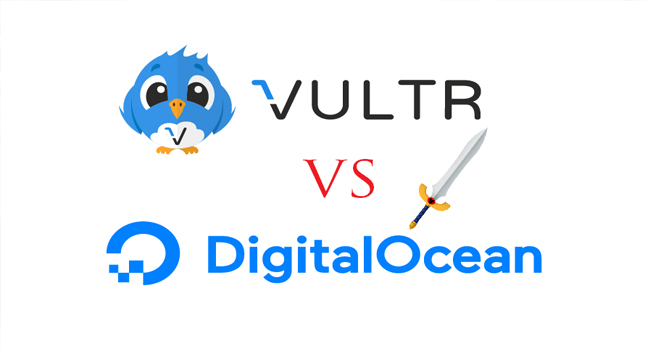Vultr vs. DigitalOcean: A Comprehensive Comparison
Vultr and DigitalOcean are two of the most popular cloud infrastructure providers, particularly known for their Virtual Private Servers (VPS). Both platforms offer robust, scalable, and affordable solutions tailored to developers, startups, and businesses of all sizes. This article aims to provide a detailed comparison of Vultr and DigitalOcean, covering their features, pricing, performance, support, and use cases to help you make an informed decision.

Overview of Vultr and DigitalOcean
Vultr
Vultr is a cloud infrastructure provider that offers high-performance cloud compute instances with a focus on simplicity and scalability. Founded in 2014, Vultr has grown rapidly, providing services from 30+ data centers around the world. Vultr is known for its ease of use, variety of plans, and competitive pricing.
DigitalOcean
DigitalOcean, founded in 2011, is a cloud infrastructure provider designed to simplify cloud computing for developers. With a focus on simplicity and developer-friendly tools, DigitalOcean offers a range of cloud services, including Droplets (VPS), managed databases, and Kubernetes. DigitalOcean operates data centers in 12 global regions.
Key Features Comparison
1. Compute Instances
- Vultr: Offers a variety of compute instances, including Cloud Compute (Standard and High Frequency), Bare Metal, and Dedicated Cloud. High Frequency instances are optimized for applications requiring high CPU performance.
- DigitalOcean: Provides Droplets, which come in Standard and General Purpose configurations. DigitalOcean also offers CPU-Optimized Droplets for compute-intensive tasks.
2. Data Centers
- Vultr: Operates 30+ data centers worldwide, providing extensive geographic coverage.
- DigitalOcean: Operates 12 data centers globally, with a strong presence in North America, Europe, and Asia.
3. Networking
- Vultr: Features include reserved IPs, private networking, DDoS protection, and direct connect.
- DigitalOcean: Offers floating IPs, VPC (Virtual Private Cloud), Cloud Firewalls, and DDoS protection.
4. Storage
- Vultr: Provides block storage and object storage solutions, with a focus on high performance and redundancy.
- DigitalOcean: Offers scalable block storage, DigitalOcean Spaces for object storage, and managed databases.
5. Additional Services
- Vultr: Managed Kubernetes, Load Balancers, and a marketplace with pre-configured applications.
- DigitalOcean: Managed Kubernetes, Managed Databases, App Platform (Platform as a Service), and a marketplace for one-click apps.
Pricing Comparison
Vultr
- Cloud Compute: Starting at $2.50/month for 1 vCPU, 512MB RAM, and 10GB SSD.
- High Frequency Compute: Starting at $6/month for 1 vCPU, 1GB RAM, and 32GB NVMe SSD.
- Block Storage: $0.10/GB per month.
- Object Storage: $5/month for 250GB storage and 1TB bandwidth.
DigitalOcean
- Droplets: Starting at $4/month for 1 vCPU, 512MB RAM, and 10GB SSD.
- CPU-Optimized Droplets: Starting at $40/month for 2 vCPUs, 4GB RAM, and 25GB SSD.
- Block Storage: $0.10/GB per month.
- Spaces (Object Storage): $5/month for 250GB storage and 1TB bandwidth.
Performance Comparison
Both Vultr and DigitalOcean offer high-performance instances, but there are some differences:
- Vultr High Frequency Instances: Utilize NVMe storage and high clock speed CPUs, offering superior performance for CPU-intensive tasks.
- DigitalOcean CPU-Optimized Droplets: Designed for compute-intensive applications, providing consistent performance with dedicated vCPUs.
Benchmarks and real-world performance tests often show Vultr’s High Frequency instances outperforming standard offerings from DigitalOcean in terms of CPU and I/O performance.
Support and Documentation
- Vultr: Provides a knowledge base, community forums, and 24/7 technical support through tickets. Phone support is not available.
- DigitalOcean: Offers extensive documentation, tutorials, community Q&A, and 24/7 technical support via tickets. Additionally, DigitalOcean has a robust community forum.
Use Cases
Vultr
- High-Performance Applications: Ideal for applications requiring high CPU and I/O performance, such as gaming servers, video encoding, and big data processing.
- Geographically Diverse Deployments: With 30+ data centers, Vultr is suitable for applications needing low-latency access from various regions.
DigitalOcean
- Developer-Friendly Projects: Perfect for developers looking for simplicity and ease of use, with a focus on rapid deployment and scaling.
- Managed Services: Great for users needing managed Kubernetes, databases, and a comprehensive platform-as-a-service solution.
Conclusion
Both Vultr and DigitalOcean are excellent choices for cloud VPS hosting, each with its strengths:
- Vultr: Offers a broader range of data center locations, high-performance instances, and competitive pricing. It’s a strong choice for applications requiring high CPU and I/O performance and geographically diverse deployments.
- DigitalOcean: Known for its simplicity, developer-friendly tools, and comprehensive managed services. It’s ideal for developers and startups looking for an easy-to-use platform with robust documentation and community support.
Choosing between Vultr and DigitalOcean ultimately depends on your specific requirements, budget, and performance needs. Evaluate both platforms’ offerings and select the one that best aligns with your project goals and infrastructure demands.